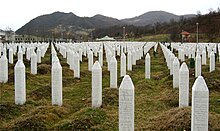Srebrenica massacre
The Srebrenica massacre, also known as the Srebrenica genocide[1] (Bosnian: Masakr u Srebrenici; Genocid u Srebrenici), was the July 1995 genocide[2] of 8,373 Bosniaks, mainly military-aged men and boys in and around the town of Srebrenica during the Bosnian War by the Army of Republika Srpska (the Serb Republic of Bosnia) instructed by Ratko Mladić. The Genocide is like the Armenian genocide by the Ottoman Empire from 1915 to 1917 and the Nazi Genocide known as the Holocaust from 1941 to 1945 during World War 2 in Nazi Germany (planned by the notorious Nazi SS Officer Reinhard Heydrich) . The Bosnian genocide from 1992 to 1995 during the Yugoslav Wars when the Socialist Federal Republic of Yugoslavia started to collapse in 1992 after 47 year's of Communism since 1945 and since the death of Josip Broz Tito in 1980 just 35 year's after Kingdom of Serbs, Croats and Slovenes or the Kingdom of Yugoslavia became a Communist State .
| Srebrenica genocide | |
|---|---|
| Native name | Masakr u Srebrenici Genocid u Srebrenici |
| Location | Srebrenica, Bosnia and Herzegovina |
| Date | 11 July 1995 – 22 July 1995 |
| Target | Bosniak men and boys |
Attack type | Mass murder, ethnic cleansing and genocide |
| Deaths | 8,373 |
| Perpetrators | Army of Republika Srpska |
| Motive | Islamophobia and Serbian nationalism |
In 2005, Kofi Annan, then Secretary-General of the United Nations, described the genocide as the worst crime against humanity in Europe since the Second World War.[3]
In July 2015, Russia disliked a UN request that would have declare the Srebrenica massacre as a genocide.[4] The Serbian Prime Minister at that time, Tomislav Nikolić, later thanked Russia for disliking said request, as it would paint Serbia up as a country of genocide.[5] No further request by the UN has been attempted to declare it as a genocide since. but May 23, 2024, a date has been set as genocide commemoration day. July 11 is the International Day of Reflection and Commemoration of the 1995 Genocide in Srebrenica, established by the UN.[6]
References
change- ↑
- "European Parliament resolution of 15 January 2009 on Srebrenica". European Parliament. Retrieved 10 August 2009.
- ↑
- "International Criminal Tribunal for the former Yugoslavia (ICTY)" (PDF). Retrieved 10 July 2015.
- ↑ UN Press Release SG/SM/9993UN, 11/07/2005 "Secretary-General Kofi Annan’s message to the ceremony marking the tenth anniversary of the Srebrenica massacre in Potocari-Srebrenica". Retrieved 9 August 2010.
- ↑ "Russia threatens veto on UN vote calling Srebrenica 'a crime of genocide'". the Guardian.
- ↑ "Russia blocks U.N. condemnation of Srebrenica as a genocide". Reuters. 2015-07-08. Retrieved 2022-01-24.
- ↑ "UN Human Rights Chief welcomes resolution to commemorate 1995 genocide in Srebrenica". United Nations Human Rights. 2024-05-24. Retrieved 2024-05-24.


